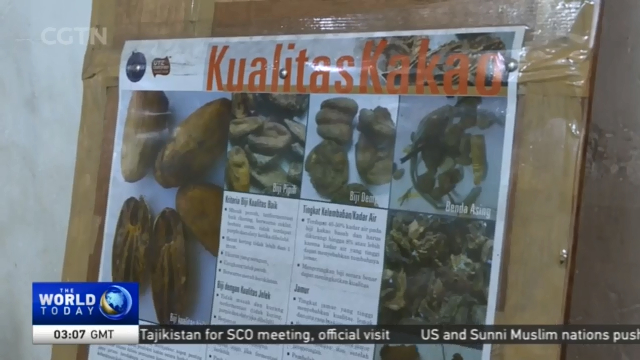
11:29, 12-Oct-2018
Indonesia Earthquake: Crops in many areas destroyed; years needed to recover
Updated
10:39, 15-Oct-2018
03:07

In Indonesia, the search for victims of the earthquake-tsunami is coming to an end. Officials say they'll end the effort to recover bodies Friday night. So far - workers have found more than two-thousand. But officials admit that thousands more may still be buried. Meanwhile, those who survived the disaster are beginning to rebuild their lives. Our correspondent Miro Lu has more from Palu.
Naftalia is a smallholder cacao farmer in Sigi, just 45 kilometres south of Palu city. Sigi, together with Palu and nearby Donggala, was hit hard by the September 28th earthquake that practically brought this part of the Indonesian island of Sulawesi to its knees.
NAFTALIA CACAO FARMER "About half a hectare of my plantation was hit by a landslide and then carried away by river currents. The condition of my friend's plantation is much worse. As many as 3 hectares of cacao trees with ripe fruits ready for harvest were washed away by landslides and river currents. So, everything is gone."
MIRO LU PALU "Cacao is an important income source for villagers in the region. In fact, Sulawesi accounts for 75 percent of Indonesia's total cacao production. The earthquake's impact on this important commodity still remains to be seen, but some farmers told me all their plantation has been destroyed and more importantly, the disruption of logistics have stopped buyers from coming."
Aheng runs an agricultural commodities trading business. Since 1987, he has been sourcing cacao, coffee beans and cloves from smallholder farmers in the region. One of his warehouses was located at Petobo, a district in Palu city that has been badly destroyed by the earthquake and liquefaction.
AHENG CACAO TRADER "Two or three days after the earthquake, I braved myself to come here. Immediately after, I couldn't come in because big trees blocked this road. My staff told me the store was completely destroyed. I said that's ok; we're lucky that you survived."
Aheng's clients are international agricultural conglomerates, such as Singapore-based Olam and US-based Cargill. The twin-disasters have completely disrupted logistics in and out of Palu city. Like his upstream suppliers, Aheng also faces a logistical nightmare in reaching his customers.
AHENG CACAO TRADER "The transport from Palu to Makassar is more difficult, more troublesome, also more dangerous because we have to take the long road now. Before the quake, we shipped our crops with big company's cargo to ports, so safety was not an issue."
Aheng doesn't know when he will reopen his business and he is worried about the bank loan he took for the advance cash payment to smallholder farmers. He says for businesses to go back to normal it might take as long as three years. Miro Lu, CGTN, Palu.

SITEMAP
Copyright © 2018 CGTN. Beijing ICP prepared NO.16065310-3
Copyright © 2018 CGTN. Beijing ICP prepared NO.16065310-3